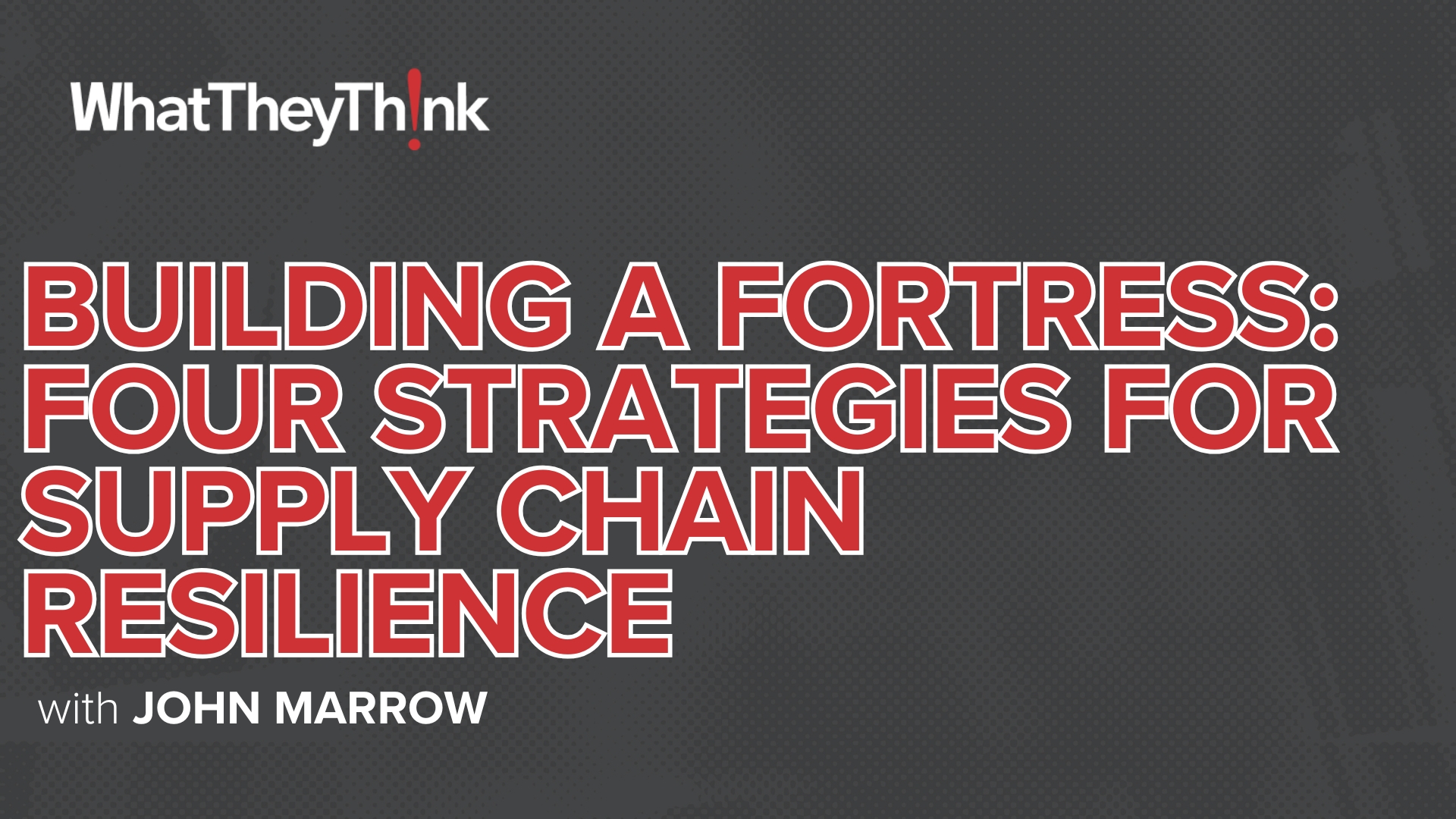Commentary & Analysis
Displaying 2051-2150 of thousands of articles
Insight You Need. Analysis You Trust.
Get the trusted insights you need to understand our evolving industry and emerging trends. Become a Premium Member.
Data Quality and Variable-Data Printing for Print Service Providers
Brought to you by The Association for PRINT Technologies (APTech), Mike Porter, President, Print/Mail Consultants, and author of this VDP 101 article, will be moderating a panel of industry suppliers and practitioners in a session titled, “Variable Print & Mail: The Software Required to Do the Job,” at the APTech Variable Data Print & Mail Summit to be held Wednesday, April 14 from 10am–3pm. Here, he offers tips on improving data for variable-data printing.
New Developments for Digital Textile Printing: The Future of Roll-to-Roll/Print-on-Demand Technologies to Explore
Digital technologies deliver sustainable production at any scale. As we move forward into the next decade, we move into a new era of digital textile production and the technologies that enable change. Textiles expert and WhatTheyThink contributor Debbie McKeegan outlines a few of the latest developments in roll-to-roll digital textile printing.
Lead Generation Strategies for Today: Part 2—Top Tools that PSPs Can Use
Lead generation has taken many forms over the years. Capturing the interest of today’s self-directed buyers involves leveraging resources that go above and beyond feet on the street. The second in a two-part series, this article considers the top tools that PSPs can use to generate interest from prospective customers. The first explored what lead generation means in today’s world.
Content Is King: But Disconnects Kill Effectiveness
We all know that content is king. Connect with your audiences using the right content and you’ve got engagement, attention, and sales. But that’s if you are sending the right content, and one survey shows that in the B2B market, there is a disconnect between what buyers need and what marketers are sending—and a big one.
Security Is the Best Medicine: The Importance of Information and Data Security in Pharmaceutical Packaging
Pharmaceutical packaging compliance, including safety and supply chain visibility, is an area that demands secure packaging and label identification. Many new compliance regulations are designed to verify the authenticity and origin of raw materials and ingredients, and to effectively, quickly, and accurately track and trace the products as they move across a global supply chain. David Zwang looks at these regulations, some of the new technologies in place to comply with them, and how print service providers can ensure they are in compliance.
Printing 2021 Quick Look: Anticipated 2021 Jobs/Orders
According to data from our recently published Printing Outlook 2021 special report, print businesses expect print industry jobs/orders to rebound +9.0% from 2020 to 2021.
Print Business Front Office Modernization: Part 5—Payment
You getting paid is as much a part of your customer’s experience as placing the order. Make every effort to streamline how much customer time you consume. A vendor that is easy to do business with creates loyal customers.
European Print Industry Snapshot: Italy
In this bimonthly series, WhatTheyThink is presenting the state of the printing industry in different European countries based on the latest monthly production numbers. This week, we take a look at the printing industry in Italy.
A Surprising Reason for More and Better In-Store Signage
There are lots of reasons to encourage your customers to beef up their in-store signage and displays. Great marketing. Safety and regulatory compliance during COVID-19. But did you know that really good signage can also make your customers less price-sensitive?
Transformational Workflow Infrastructures v2021
Business processes and production workflows cannot be stagnant and need to evolve as the markets and technologies evolve. Understanding the need and creating an infrastructure that supports that is key. The good news is that the options are improving.
Four Must-Attend Events at ISA Sign Expo 2021–Virtual…And Three Tips to Make the Most of It
ISA Sign Expo 2021–Virtual is coming up on April 7–9. This article, sponsored by the International Sign Association, previews four essential features to attend, and offers tips for navigating the virtual event.
Finding Our Way: Printed Signage Helps us to Navigate Safely Through the COVID-19 World.
Wayfinding signage abruptly evolved during the COVID-19 pandemic. Contributor Mark Vruno looks at how sign companies coped with the change—and surge—in demand.
Can We Put the Whole Fast Fashion Thing in the Rearview? Just Sayin’
Fast fashion became a thing around the turn of this century. It’s the process of churning out low-quality, you could even say disposable, clothing to take advantage of every passing fad and trend. But in this writer’s humble opinion, this has to stop! We are choking our oceans and landfills with junk clothes. Can we put more focus on quality and durability? Just sayin’.
Around the Web: More Fungible Fun. Denim Denial. Guilty Garamond. Zoom Zapper. Tattoo Technology. COVID Concert. Gallbladder Gambling. Culinary Compulsion. Legume Limo.
Charmin’s (oy) toilet-paper themed NFTPs. The environmental impact of jeans. Will graphene save us from the pandemic? The DC Circuit Court cancels the typeface Garamond. Social and mobile media-themed classic artworks. A new web widget that gives you excuses to exit a Zoom meeting. Light-emitting OLED tattoos. Yo-Yo Ma performs at his vaccination site. Doctors get in trouble for “Guess the weight of this organ” Instagram posts. Precision cutting boards for obsessive chefs. The Planters NUTmobile is looking for drivers. All that and more in WhatTheyThink’s unfortunately not canceled miscellany.
Graphic Arts Employment—February 2021
In February 2021, all printing employment is down -0.5% from January, production employment down -0.4%, and non-production printing employment down -0.8%.
The Paradoxes of Stress
We all, at one level or another, understand that we live in difficult times. Never before have we expected, even demanded, so much from our leaders. Meeting those expectations is the most fundamental challenge for today’s leaders. Since leadership implies followership, if we don’t meet those expectations, the best we’re likely to get is disinterested and disengaged followers. We must strive to be better.
Lead Generation Strategies for Today: Part 1—What “Lead Generation” Means Today
Lead generation has taken many forms over the years. Capturing the interest of today’s self-directed buyers involves leveraging resources that go above and beyond feet on the street. The first in a two-part series, this article explores what lead generation means in today’s world. Part two will consider the top four tools that PSPs use to generate interest from prospective customers
Forest Digital of East Sussex Say that Their Epson Monna Lisa Evo Tre Is a Masterpiece in Digital Textile Printing
Working with top-end designers to create exclusive short runs means the fabrics printed at Forest Digital are not contributing to the “cheap-throw-away fashion” landfill that is so damaging to our world. In fact, we should be eliminating the term “fast fashion” from our vocabulary and our practices! Learn more about what this leading producer is doing to bring more sustainability to the industry.
Beyond the Bottle: Opportunities and Challenges in Pharmaceutical Packaging
Like many other industries, pharmaceuticals is going through a transition, and as we have seen before, industries in transition offer opportunities for those who are willing to learn and engage. David Zwang provides an overview of the latest trends in pharma packaging, and how to identify and take advantage of the opportunities.
Printing 2021 Quick Look: 2020 Jobs/Orders
According to data from our recently published Printing Outlook 2021 special report, the average number of jobs decreased -10.8% from 2019 to 2020.
Print Business Front Office Modernization: Part 4—Artwork
You can’t start printing until you have approved artwork, but you don’t have complete control over this step in the process. You can optimize your press and finishing processes down to the second, yet you might wait three full days for artwork approval. The best you can do is make it as easy as possible for the customer to respond in a timely manner. Don’t confuse them, don’t make them work, and don’t underestimate convenience.
ISA Quarterly Economic Report Looks at the Top 10 Economic Trends for 2021 and Their Impact on the Sign Industry
A recent ISA webinar looked at how the sign and display markets fared in Q4 2020, and offered up some forecasts for 2021, which IHS Markit analysts see as a “transitional year” from COVID to post-COVID while 2022 will see the rebirth of the economy, employment, and the industry.
Be Inspired: Mactac Gives Back...and You Can, Too!
Consistently, surveys show that giving back to the community increases a brand’s favorability among buyers. Never has this been more true than during the pandemic. That’s why stories like “Mactac Gives Back” resonate so deeply.
As the Market Changes, It’s Good to Have Partners in Growth
Over the years, Kodak has developed many groundbreaking products and, along the way, very strong bonds with their customers. Considering their long history supporting print service providers with consumables and digital process solutions, they have been able to enhance their clients’ business growth and create a great platform for Kodak’s business growth as well, it makes perfect sense.
Coffee Is for Closers: Double Down During the “Qualify Stage” and Watch Your Close Ratios Skyrocket
Picture more contracts this year. Imagine fewer “stalls” or “stops” during your sales process. Visualize the impact of improved close ratios on your commissions. To make these dreams a reality, Lisa Magnuson talks about the “Qualify Stage.”
Book Printing and Publishing in Europe
One of the oldest pastimes gained in popularity during the COVID-19 pandemic: reading books. This is good news for the printing industry as book printing contributes a considerable share to the total print production. Revenues in Europe stood at €7.1 billion in 2019. WhatTheyThink European section editor Ralf Schlözer looks at historical developments and at the trends shaping book printing now.
Executive Q&A: Durst Expands Its Virtual Demo Capabilities
Cary Sherburne talks with Christoph Gamper, CEO of Durst, and Christian Harder, Vice President of Sales, about the current state of their business, which segments were performing better than others, and how the company was helping customers to innovate, even during this pandemic, including holding virtual demonstrations, introducing new products, and more.
Around the Web: Fungible Fanatics. Cotton Conundrum. Clever Corsets. Screen Surfeit. Capricious Cartography. Tent Trumpeting. Healthy Handle. Trial Terror. Munster Meteorology.
A JPG file sells for $69 million, for some reason. Cotton and polyester have their environmental downsides—but neither is going away any time soon. A new company converts discarded sneakers into corsets. A new laptop prototype has seven screens. How to fool AI using “typographic attack.” A non-existent town on a map briefly becomes real. A high school band practices in individual tents. A self-disinfecting door handle. A Zoom assault trial reveals that the defendant is actually in the same house as the alleged victim. Grampa Munster once did a real weathercast. All that and more in WhatTheyThink’s non-fungible miscellany.
Book Printing Employees—2010–2018
According to County Business Patterns, in 2010, there were 28,935 employees in NAICS 323117 (Book Printing Establishments). By 2018, employees had declined to 21,976. In macro news, inflation was soft in February.
New Developments for Digital Textile Printing Inks—Sustainability and Superfast Production
One of the key components of the digital textile printing ecosphere is inks—and increasingly, sustainable inks. In this article, textiles expert and WhatTheyThink contributor Debbie McKeegan reviews the latest developments in ink technology for digital textile printing.
The Power of Personalized Print in Today’s Multi-Channel World
Savvy print providers are discovering that targeted—or better yet, personalized—print campaigns can enable market differentiation and provide a greater return on investment. This article explores how getting back to the basics with traditional direct mail can help businesses stand apart from their competitors.
Vax Populi: Now that COVID Vaccinations Are Underway, What Does That Mean for Display Graphics?
Signage has almost always been one of the most essential means of communicating important messages, which was why wide-format and sign shops early on in the pandemic were considered “essential services.” Health and safety messaging was the killer app for display graphics in 2020, and that is going to remain the case for the foreseeable future. Here’s what to look for.
Print Business Front Office Modernization: Part 3—Orders
How are orders managed before they hit the press? In this third part of a five-part series, Jennifer Matt defines the complete order process from initial inquiry to invoice payment. This means a great deal of the process happens in the carpeted area of your print business.
Printing 2021 Quick Look: Anticipated 2021 Revenues
According to data from our recently published Printing Outlook 2021 special report, print businesses expect print industry revenues to rebound +9.1% from 2020 to 2021.
Bridging Strategy to Execution: How to Implement the Three Cs
Studies have shown that as many as 90% of well-formulated strategies fail due to poor execution. These are epic failure rates that, but for a plan to bridge strategy to tactical execution, could instead be sustainable successes. Why then do leadership teams continue to endure poor execution? Admitting that there is a problem is a good first step, followed by a decision to do something about it.
The Power of Social Media...on Packaging
Customer product reviews are a powerful tool in e-commerce, and positive reviews often make the difference between someone making a purchase or not. Those reviews are in the public domain, so why not use them in print marketing, too? This company did.
Three Buyer and Seller Rules: Feedback Worth Sharing on Selling Your Software!
Pat McGrew responds to feedback she received from a recent article on selling software, shares some ill-fated buyer stories, and draws up “three rules for software buyers” and “three rules for software sellers.”
Cracks in the Crystal Ball: How the Pandemic Has Driven Change in the Printing Industry
There is no question that the pandemic had a deleterious—and immediate—impact on the printing industry and the economy as a whole. While both now look to be on the road to recovery, although slower than we ever could have anticipated, it’s interesting to look at how and when that might actually occur based on research largely conducted in the final quarter of 2020.
The Print Taxonomy Initiative—Or, What Is Print and Where Is It?
The print industry has been going through a major evolution since the introduction of digital technologies. Trying to identify and quantify this shift has been almost impossible since many of the definitions of print and printing technologies haven’t been properly updated in decades. An important new initiative is tasked with drafting an “open” standard taxonomy for the global printing industry to address the issues.
So Many Books, So Little Time* —February 2021 M&A Activity
Lake Book Joins Grafica Veneta, Outside Media Integrates, JN White Acquires ECI Screenprint, and more…
January Printing Shipments—They Can Only Get Better from Here
We kicked off 2021 inauspiciously with January printing shipments coming in at $6.61 billion, down from 2020’s $7.17 billion. It's the worst January in at least the last five years, but already things are boding well for the rest of 2021.
Around the Web: Cephalopod Selfie. Locked Letters. Evolving Expression. Silly Surgeon. Traumatic Toy. Touch Termination. Myopia Mask. Titanic Television. Plush Paintings.
An octopus’ selfie—but, unfairly, not the octopus—won a photography award. Using X-ray microtomography to read secret letters. Videoconferencing is changing American Sign Language. A plastic surgeon joins a Zoom call—while in the middle of an operation. Fisher Price’s My First Home Office for preschoolers is perhaps a sign of the apocalypse. Holographic keypads for touchless devices. A face mask specifically designed to prevent fogging. A $400K television that folds down into the floor. Classic works of art rendered in fur. All that and more in WhatTheyThink’s miscellany.
What Is an Identity Graph and Why Does It Matter?
What is an identity graph and why does it matter? In a nutshell, it is the “next generation” customer identity management. Think of it as marketing’s version of an FBI profile.
Why Greendrop of Italy Chose Pigments and Green Technology from Epson—Smart Digital Textile Printing
Textiles expert and WhatTheyThink contributor Debbie McKeegan says the biggest driver of change in the textile industry is its past history. Now exposed as the second largest polluter of our planet, the conventional textile industry needs to clean up its legacy production processes and evolve. Greendrop of Italy is doing just that.
Automation for the Win!
Automation is the next step in a successful future. It enables print service providers to tackle a growing number of print orders with the greatest efficiency and accuracy. Beyond having financial and practical benefits, it can be yet another differentiator that helps organizations stand apart from their competitors. This article discusses the most common benefits of automation and offers insights into how to overcome the challenges associated with implementing it.
The Job’s Not Finished ’til It’s Finished and Out the Door
Is your finishing operation holding your business back? Or depressing your margins with labor-intensive processes or waste caused by bindery errors? Are finishers disconnected islands in your workflow automation? This article, the third in a series sponsored by EFI, explains how to integrate the printing operation with nearline finishers to complete automation from prepress to finishing.
Printing Outlook 2021 Quick Look: 2020 Revenues
According to data from our recently published Printing Outlook 2021 special report, print industry revenues dropped -12.6% from 2019 to 2020, compared to +4.1% from 2018 to 2019.
Print Business Front Office Modernization: Part 2—Prospects and Customers
Think about your front office in terms of what “objects'' you need to manage there. In part 2 of a five-part series, we discuss customers and prospects. This means tracking sales activities and inserting more valuable information (both quantitative and qualitative) into your Print MIS regarding your customers.
European Print Industry Snapshot: United Kingdom
In this bimonthly series, WhatTheyThink is presenting the state of the printing industry in different European countries based on the latest monthly production numbers. This week, we take a look at the printing industry in the United Kingdom.
Nine Continuous-Feed Inkjet Webinar Takeaways
Takeaways from a recent webinar on assessing continuous-feed (CF) inkjet for your print operation.
So…You Want to Buy Some Software!
More and more printing companies are engaging with workflow automation solutions, which tend to bring better margins and often increase available capacity with current equipment. This is a path open to all companies—but walk carefully. In this feature, Pat McGrew explains how to evaluate your current software environment and what areas can offer the biggest returns.
APTech Brings Research, Standards and Education to 2021
Association for PRINT Technologies (APTech) President Thayer Long details APTech’s latest developments, and discusses the programs, events, and other services the association has planned for 2021.
Key Thermal Print Segments Poised to Rebound in 2021
COVID-19 has had a profound effect on thermal print equipment and consumable sales, but these will return to positive growth in 2021, according to the Smithers study The Future of Thermal Printing to 2025. This article summarizes some of the main trends identified in the study.
Is the Apparel Industry in the Midst of a Systemic Change?
In a recent TexProcess/TechTextil webinar, panelists discussed what is happening with respect to the textiles and apparel supply chain, especially what has been accelerated by the pandemic. Has there been a sourcing shift? Is there a balance shift between Western and Asian sources? What key elements do brands and suppliers need to address to bring about needed systemic change? How many are even capable of driving systemic change? These were some of the questions and issues discussed in this very interesting session.
Around the Web: Lockdown Lyrics. Poet Praise. Sneaker Snafu. Tinseltown Typing. Expensive Ephemera. Art Aging. Prying Pixels. Picturephone Promo. Transdermal Transponder. Busy Beaver.
The musical British family who wittily chronicle lockdown life. Marking the bicentenary of John Keats’ death. Adidas seeks to ditch its acquired Reebok brand. “Hot typewriter action” scenes from top movies. The booming market for “nonfungible tokens”—digital art, ephemera, and media. An oil painter who specializes in lenticular art. The “spy pixels” in email messages that track you. A promotional film for 1964’s pre-Zoom Picturephone, a commercial dud. Why “Zoom fatigue” is a real thing. The aptly named DangerousThings lets you inject chips and sensors into your body, for some reason. A “rescue beaver” is compelled to dam up open spaces—indoors. All that and more in WhatTheyThink’s Martian miscellany.
Commercial Screen Printing Employees—2010–2018
In 2010, there were 57,674 employees working in US screen printing establishments (NAICS 323113). By 2018, that number had increased +12.4% to 64,840. In macro news, seven “recovery indicators” for parts of the economy most acutely impacted by the pandemic.
Leveraging the Evolution of High-Speed Inkjet in Today’s Digital World
Concerns about data security have escalated in the COVID era, making some people wary of digital engagements. As a result, traditional print-based communications remain effective and can sometimes enable businesses to stand apart from their competitors. This article explores how print service providers can use high-speed inkjet equipment to their advantage
New Year, New Adventures: Marc Olin, Ken Garner and Michael Makin Make Their Exits…for Now
Cary Sherburne speaks with three printing industry veterans who have chosen to make a new beginning: Marc Olin, former COO at EFI; Michael Makin, former CEO of PIA and EVP at PRINTING United Alliance; and Ken Garner, former SVP for Content Creation at the Association for Print Technologies. As they start the new year with new adventures, we wanted to give them special recognition for all of their contributions and years of service to the industry.
Imageco Gears Up for Sustainable Digital Print Production with the New HP Latex 800 Series
Imageco is on a mission to greater sustainability, driven by their own sustainability concerns and customer demand. In this article, textiles expert and WhatTheyThink contributor Debbie McKeegan explains how the company is pursuing these goals with the latest HP Latex technology.
drupa 2021 Essentials of Print: Woodworking Surface Decoration—Digital Horizons within Reach?
A new focus on mass customization and a growing demand for sustainability are causing digital printing to become more vital in one area of industrial printing: woodworking. We expect to see continued growth in the woodworking industry as a whole, including categories like furniture. This article will focus on two key areas where industrial printing has a significant impact: digital décor paper for laminates and direct printing in the woodworking industry. Ron Gilboa explores the opportunity and technology that is driving this innovation to be adopted.
Direct Mail Lessons from After Five Tuxedo Rental
A closer look at a case study from Postcard Mania with takeaways for other print providers about boosting their own direct mail business.
Print Business Front Office Modernization: Part 1—Guiding Principles
This article, the first of a five-part series on the modernization of your print business front office, starts with some guiding principles and then discuss the various “objects” that are managed by the carpeted area of your plant.
The Expertise to Innovate with New Inkjet Applications: NIXKA
NIXKA may be the new kid on the block, or are they? They actually have 30 years of expertise in developing ink and material jetting solutions, with an impressive track record. More importantly, they have the right philosophy.
Get Ahead of the Tech Curve: Smart Signage Expands Experiential Marketing Opportunity
Connecting brands to consumers is incredibly important, and in the print and sign industry, it’s all about making consumers feel a part of something larger than themselves. In this article, guest contributor Larry Oberly, President & CEO of SpeedPro, explains the advantages of SpeedPro’s InfoLnkX NFC application for creating interactive, touchless, smart signage.
Executive Q&A: John Mills, CEO of Xaar
John Mills, CEO of Xaar, talks about the company’s rebranding strategy, the new ImagineX printhead platform, and the “new Xaar.”
European Environmental Legislation for Print
Environmental considerations are becoming more and more important factors in buying decisions of consumers and businesses, and this is supported by environmental legislation. This article by European section editor Ralf Schlözer looks at the latest developments in environmental legislation for print in Europe.
Are Bio-Based Plastics the Answer to Increased Sustainability? The Jury Is Still Out…New Research Is Encouraging, but Consumer Behavior Also Has an Important Role to Play
A push toward a more sustainable textiles and apparel industry is underway, largely driven by consumer demand, and, to some extent, by brands who are working to restructure their supply chains post-pandemic. Key considerations include not only the adoption of more digital technologies, about which we have written extensively, but also the further development of fabrics created from bio-based materials, and a significant change in consumer behavior with respect to their wardrobes. Learn more about the pros and cons of bio-based materials, some of the emerging developments, and behavior changes that can reduce your personal textiles-based environmental impact.
There’s Gold in Those Hills: Are You—Or Your Salespeople—Doing Enough Prospecting?
If you want to make more money—and minimize the risk of making less—you should do more prospecting. Contributor Dave Fellman looks at the prospecting process and how to arrive at the ultimate goal of prospecting: a first meeting with a potential new customer.
December Printing Shipments—One Last Unexpected Twist for 2020
In December 2020, in one last, end-of-the-year rally, printing shipments grew from $7.0 billion to $7.17 billion.
Around the Web: Mars Meeting. More Monoliths! Wicked Wheels. Safe Socializing. Modular Mask. Vegan Vestments. Ovine Ovation. Carbon Conundra. Textile Traffic. Saloon Sounds. Audio Oracle. King Cat.
A new monolith appears—briefly—in Congo. A guy replaces his bicycle wheels with giant sawmill blades. The latest in “mask tech”: the egg mask. First, they came for the silkworms—and now…the sheep? Sheep Inc. says one key to carbon sequestration is…wait for it…sheep. Some other potential solutions for dealing with carbon and carbon dioxide. Textile and apparel imports are on the decline. A website lets you simulate the ambiance of your favorite bar. RIP Rupert Neve: the inventor of the mixing console. A housecat joins “Godzilla vs. Kong” and the related carnage. All that and more in WhatTheyThink’s carbon-heavy miscellany.
Is Your Company Self-Aware Enough to Change Successfully?
The writers and publishers who chronicle the world of business have been a buzzword factory for the last four decades. There’s no need to list them here, but probably the most frequently mentioned topic in the last few years has been how to change an organization into something that has a better chance of surviving and thriving. In this article, Wayne Lynn discusses the importance of becoming self-aware. Knowing what your strengths, weaknesses, and blind spots are provides the best starting point for successful change. Read on…
Five Textile Design Archives Offering Original Vintage Patterns for Interior Furnishings and Fashion
Over the centuries, fine art and textile design have always been close companions. Today's textile designers can take advantage of a number of outstanding archives of vintage designs that can act as inspiration, or be licensed for use. Textiles expert and WhatTheyThink contributor Debbie McKeegan highlights a few.
Want Growth? Then Automation is What You Seek!
The increase in digitally driven on-demand printing, combined with the flexibility of online ordering, has greatly increased the number of print orders—often at lower print volumes—that a print service provider must manage and produce. This article explores how PSPs that increase their levels of automation now may be able to reap disproportionate rewards in the future.
Prepress Automation Made Easy
If you have taken the first steps to automating your workflow, you will have seen significant benefits from software you had likely already invested in. In this article, sponsored by EFI and the second in a series, explores how to take your workflow automation to the next level by examining your prepress operation to uncover bottlenecks that require extra labor and slow the production process.
Printing Outlook 2021: Profitability, Planned Investments, Hiring
WhatTheyThink’s Fall 2020 Business Outlook Survey asked print business executives and owners about their 2020 business conditions, business challenges, biggest perceived opportunities, and investment plans, as well as opinions of virtual events and their 2020 hiring plans. The results of this survey are included in WhatTheyThink’s Printing Outlook 2021 special report. Here are some of the top-level findings from that report.
Considering a Non-Print-Specific MIS/ERP
If you run a print manufacturing business, chances are you should invest in a print-specific MIS/ERP solution. However, proceed carefully if you insist on adopting a generic MIS/ERP software solution. Don’t get caught up in paying for customizations that are expected features for a print business.
Packaging Prepress Services Adapt and Expand
As packaging requirements change and the transition to digital printing increases, who will pick up the mantle?
Main Routs: Options for Adding Traditional Signmaking Capabilities
An introduction to one of the essential tools for traditional signmaking: the CNC router.
So…Someone Wants to Buy Your Software
Selling software is not like selling hardware. Pat McGrew offers tips and suggestions for acquiring the skillset needed to successfully sell software solutions.
European Print Industry Snapshot: Germany
In this bimonthly series, WhatTheyThink is presenting the state of the printing industry in different European countries based on the latest monthly production numbers. This week, we take a look at the printing industry in Germany.
Wield the Data Sword: How to Use the Growing “Datasphere” to Your Advantage
The successful curation of the data springing from your business operating systems has the potential to unearth rich clues for improved growth and performance. However, it can be a daunting task to know where to start and where to stop. Preston Herrin offers a balanced approach to metrics and analytics and understanding how to apply them in your business to advance a data-driven culture and galvanize a new agility.
Printed Electronics: High Value, High Touch
From life-saving medical devices and rapid COVID-19 tests, to dashboards and musical instruments, printed electronics are a high-value opportunity. To exploit the opportunity requires high-touch engineering and customer support. Contributor Pete Basiliere details the challenges.
Around the Web: Cat Court. Color Creation. Sustainable Suds. Apt Appliances. ’Acked Aquifer. Manufactured Meat.
A Texas attorney tries to prove he is not a cat. A brand-new shade of blue is now available for painting. A new business makes sustainable laundry detergent. A handy visual aid to help you determine which appliance is best for which use. A water treatment plant gets hacked—with almost disastrous results. 3D-printed steaks. All that and more in WhatTheyThink’s kitten filter miscellany.
Commercial Printing Employees (Less Screen and Books)—2010–2018
In 2010, there were 380,107 employees working in US establishments in NAICS 323111 (Commercial Printing–Except Screen and Books). By 2018, that number had declined -13.5% to 328,845. In macro news, the Consumer Price Index (CPI) increased 0.3% in January, or 1.4% over the last 12 months.
Checking the Mail: A 2020 USPS Year in Review
Christine Erna looks at the problems that the United States Postal Service had to contend with in 2020—and looks ahead to 2021.
Pre- and Post-COVID Trends Drive Changes in Wide-Format Print Software
The COVID pandemic has accelerated some older—and created other new—trends an demands for automation and other wide-format printing software.
In Many Companies, New Digital Workflows Will Outlast the Pandemic
Some of the digital processes that were implemented out of necessity when the pandemic hit will likely persist even once the pandemic has subsided. This article discusses the implications of business process digitization and cites recent research from Keypoint Intelligence to explore considerations for the future.
Why Customer Journeys Matter More During a Pandemic
Even if printers are not in the market for a new marketing automation system, tracking the new and updated features of available platforms provides insight into where marketing is going and what they (and their customers) need to watch, both now and in the future. One such change is the increased use of AI to speed and simplify the identification and understanding of customer journeys. As COVID-19 ramps up and consumers tighten their belts (again), the timing couldn’t be better.
Orchestrating Success: Advice from Trade Print and Service Leaders
Every motion you make in your business sets the tone for the ultimate performance of the supply chain. Whether you are a manufacturer/service provider shepherding the genesis of the supply chain or a reseller/distributor working bi-directionally within the supply chain, success hinges on advanced collaboration in order to deliver on customer expectations. Preston Herrin takes our annual look at trade brokering and distributing.
So Your Print Sales Team Isn’t Very Technical
Technical skills are important in every functional area of your print business and sales is no exception. Every salesperson needs to be able to calmly and strategically uncover business challenges and communicate these challenges to your technical resources without limiting potential solutions or setting unreasonable expectations with the customer.
Is There a First-Mover Advantage for Inkjet? Five Inkjet Early Adopters Share Their Experiences
Why would a printing business want to be an early adopter and take a risk on unproven technology? Inkjet Insight’s Elizabeth Gooding spoke with five technology leaders using inkjet in quality-sensitive operations about their experiences as pre-release adopters of production inkjet presses.
Johnson’s World—Ask Your Customers to Be Your Valentine
Why do we give a Valentine gift to a loved one? To make that person feel loved and appreciated. Don’t you want your clients to feel loved and appreciated as well? Send them a Valentine’s Day card!
Inkjet for Corrugated Is Not Just for Short Runs
Here are two corrugating companies that have found that production inkjet in place of the litho laminate process makes great operating and financial sense.
HP Indigo and Esko—Driving Labels and Packaging Automation into the Future
2020 was a remarkable year for labels and packaging, particularly digitally printed pressure-sensitive labels, sleeves, flexible packaging, and other high-demand applications for the health, pharma, household, and food industries. The demand for digitally printed labels and packaging has grown significantly during the pandemic and customers are investing more in workflow and automation to manage the load. In this article, sponsored by HP, we spoke with HP Indigo’s Maya Poleg, Head of Products and Solutions, and Esko’s Chuck Ravetto, VP & General Manager, Supplier Solutions, to hear their perspectives on their long-standing relationship, and where they believe the industry is heading.
Sizing the European Printing Industry: The Nordic Countries
This is the sixth part of a series of articles on the size of and trends in the printing industry in key countries in Europe. The Nordic countries in Europe include Denmark, Finland, Norway, and Sweden. Together, they account for €4.7 billion in revenues in the graphic arts industry and more than 25,000 employees. Combined, the Nordic region would constitute the sixth largest printing industry in Europe, closely followed by Spain. There are additional print segments, as well, adding to a total print market of close to €7.5 billion
As Goes the Industry, so Goes the Trade Associations—January 2021 M&A Activity
Printing United Alliance Sets the Standard, H.I.G. Bags Action, BluEdge Expands, and more…
Around the Web: Spamming Spinach. Novel Novel. Glorious Graphene. Sleeping Sacks. Gargoyles Galore. Sawing Celebration. Calculating Carsey. Weird Waking. Amish Auto. Disappearing Doll.
Spinach can now send emails. A novel only uses the words spoken by Ophelia in Hamlet. More graphene news! Recycling potato chip bags into sleeping bags for the homeless. Colgate introduces new aluminum toothbrush with replaceable heads. The origin of gargoyles. 100 years of the “sawing a woman in half” trick. “A Lego white noise” playlist. A “smart toilet seat” for measuring vital signs. A teen, in a coma since March 1, 2020, is about to wake up to a strange new world. Attaching buggy wheels to a Dodge Challenger, for some reason. Texas issues an Amber Alert for Chucky from “Child’s Play.” All that and more in WhatTheyThink’s emailing vegetable miscellany.
Q3 2020 Profits—Back on Track…Sort Of
Annualized printing industry profits for Q3 2020 rose from -$1.92 billion to -$1.19 billion. That’s still really low, but at least it’s headed back toward positive territory.
Using Data to Improve the Power of Personalization
Print’s days of channel dominance are most certainly over, but it remains a powerful means of communication. Digital is here to stay, so it is more important than ever for printed communications to be fresh and innovative. This article explores how data can be leveraged to create personalized print campaigns that encourage engagement and increase revenues.
Exploring the Possibilities of Interior Décor Printing with HP—Live from Barcelona with Leading Industry Experts
Textiles expert and WhatTheyThink contributor Debbie McKeegan recently attended a very interesting session on the possibilities digital print offers for home décor. Presenters included a variety of industry experts with excellent insight. The piece also includes links to replays in case the reader wants to hear directly from the experts.
- Questions to ask about inkjet for corrugated packaging
- Can Chinese OEMs challenge Western manufacturers?
- The #1 Question When Selling Inkjet
- Integrator perspective on Konica Minolta printheads
- Surfing the Waves of Inkjet
- Kyocera Nixka talks inkjet integration trends
- B2B Customer Tours
- Keeping Inkjet Tickled Pink
© 2024 WhatTheyThink. All Rights Reserved.














